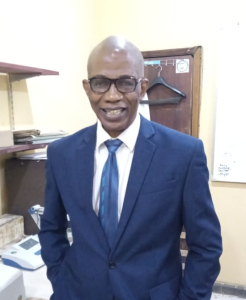
GEOFFREY OBINNA ANOLIEFO
PRESIDENT OF AkSES & CHAIRMAN, BOARD OF TRUSTEES
Faculty of Life Sciences
University of Benin, Benin City
B.Sc (1980), M.Sc (1981) (Alabama State University, Montgomery Alabama. USA), Ph.D (University of Benin, Benin City, Edo State Nigeria) 1991, Post-Doctoral Training and Mentorship under Late Prof. Lachman Singh Gill (1992-1995).
Geoffrey Obinna Anoliefo is Professor of Eco-physiology and Remediation Technology in the Department of Plant Biology and Biotechnology, University of Benin, Benin City Nigeria. He has remained focused on three key research areas since 1987; petroleum perturbations on the physiology of higher plants, bioremediation of contaminated soils and environmental sustainability, with emphasis on the employment of Sacred Groves in the indigenous conservation of germ plasm.
Dr. Anoliefo spent his first few years after the Ph.D, studying the impact of different pollutants (hydrocarbons and heavy metals) on plant metabolism. Later, in the early 1990s, he delved into the then uncharted field of bioremediation. The interest enabled him to secure a Fellowship by the National Agricultural Research Foundation, Greece, to conduct research on the effect of olive oil mill waste water on higher plants, at the National Agricultural Research Foundation, Institute of Kalamata, Lakonikis Greece. The choice of the pollutant was at the instance of the Greek government; because that was the pollutant of interest, at the time, in that country. Dr. Anoliefo also spent some research time in Zambia. While there, he exposed students under his supervision, in the Copperbelt Science Teachers College (now Mukuba University) Kitwe Zambia, to the phyto-toxic effects of heavy metals associated with the Copper Mining industry.
He has over one hundred (100) peer reviewed journal articles and conference papers; one of which earned him a citation in the Carol Litchfield publication in the 2005 BioScience- ‘‘Thirty years and counting, bioremediation in its prime?’’ He has vast experience in the Oil Industry (consultancy and sabbatical).
Dr. Anoliefo has kept his foot on the ‘pedal’ on the pollution, development, and loss of biodiversity. The unsustainable approach to development in the third world, especially Africa and in particular Nigeria has remained one of the major causes of deforestation and land degradation. He has, since the year 2000, progressively studied many Nigerian villages, which metamorphosed from sleepy, clean, forested and environmentally friendly places to ‘brick-forested’, dirty and crowded cities, which have continued to ‘develop’ unsustainably. He is a strong advocate of inter-disciplinary, inter-university and intercultural research.
Dr. Anoliefo has provided mentorship to students since the 1990s; from Course adviser through Seminar/Project coordinator to the establishment of one of the most formidable research groups in the University of Benin; the Environmental Biotechnology and Sustainability Research (EBSR) group (https://ebsrgroup.org.ng/). The EBSR laboratory (furnished with grant funding) has equipment that compares favourably with any other averagely furnished private staff laboratory for basic and advanced research in Plant Biology, Ecophysiology and Biochemistry as well as phyto-, microbial and myco-remediation studies. The EBSR laboratory is ‘home’ to students under my supervision as well as the students being supervised by senior academics who obtained their Ph.Ds under me. The laboratory hosts Industrial Training (IT) students from the Department of Plant Biology and Biotechnology, other departments in the University of Benin and sister Universities in Plant Biology and other Pure and Applied Science areas.
An M.Sc student from the University of Ghent, Belgium satisfactorily spent two months in 2017 in the EBSR laboratory under the International Association for the Exchange of Students for Technical Experience (IAESTE). Since 2017 to date, more than ten (10) foreign interns have spent quality research time in the EBSR laboratory, under the IAESTE program.
The EBSR Group successfully organized an international (virtual) conference (https://ebsrgroup.org.ng/conference.php) in January 12-13, 2022, and the Alkebulan Society for Environmental Sustainability (AkSES), registered with the Corporate Affairs Commission is an offshoot of that Conference. Dr. Anoliefo is a pan-Africanist; haven initiated a National indigenous choral music competition in 1995 called the Forum for the Inculturation of Liturgical Music; whose objectives are to indigenize worship and encourage inculturation. The biennial music festival has been hosted by all the Federal and some State Universities in Nigeria. Dr. Anoliefo enjoys writing, is a pianist and chorister. He is married with children and grandchildren.
i. AREAS OF SPECIALIZATION
Influence of plant/rhizosphere on the remediation of contaminated soil and water.
Local sourcing and use of indigenous biosurfactants in the remediation of polluted sites. Phyto-eco-documentation of metalophytes and the impact of unsustainable developmental activities on ecosystems.
Community-driven reforestation and afforestation.
Re-investment in indigenous taboo practices for environmental sustainability.
